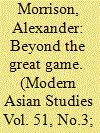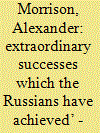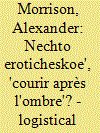|
|
|
Sort Order |
|
|
|
Items / Page
|
|
|
|
|
|
|
| Srl | Item |
| 1 |
ID:
153584


|
|
|
|
|
| Summary/Abstract |
Drawing on published documents and research in Russian, Uzbek, British, and Indian archives, this article explains how a hasty attempt by Russia to put pressure on the British in Central Asia unintentionally triggered the second Anglo–Afghan War of 1878–80. This conflict is usually interpreted within the framework of the so-called ‘Great Game’, which assumes that only the European ‘Great Powers’ had any agency in Central Asia, pursuing a coherent strategy with a clearly defined set of goals and mutually understood rules. The outbreak of the Second Anglo–Afghan war is usually seen as a deliberate attempt by the Russians to embroil the British disastrously in Afghan affairs, leading to the eventual installation of ‘Abd al-Rahman Khan, hosted for many years by the Russians in Samarkand, on the Afghan throne. In fact, the Russians did not foresee any of this. ‘Abd al-Rahman's ascent to the Afghan throne owed nothing to Russian support, and everything to British desperation. What at first seems like a classic ‘Great Game’ episode was a tale of blundering and unintended consequences on both sides. Central Asian rulers were not merely passive bystanders who provided a picturesque backdrop for Anglo–Russian relations, but important actors in their own right.
|
|
|
|
|
|
|
|
|
|
|
|
|
|
|
|
| 2 |
ID:
168212


|
|
|
|
|
| Summary/Abstract |
Charles Callwell’s Small Wars (1896, 1899, 1906) is widely considered both an ur-text for modern counter-insurgency studies, and a primer for the racialized late-Victorian approach to war against ‘savages’: either way it is usually only considered within a British context. Alongside the numerous examples Callwell used from British colonial campaigns, he frequently referred to those of other European powers – notably the Russian conquest of Central Asia. This article will seek to analyse Callwell’s views of Russian colonial warfare, establish the sources on which he relied, and evaluate his accuracy and the effect which the Russian example had on his thinking.
|
|
|
|
|
|
|
|
|
|
|
|
|
|
|
|
| 3 |
ID:
131403


|
|
|
| 4 |
ID:
131405


|
|
|
|
|
| Publication |
2014.
|
| Summary/Abstract |
This article explores the debates that preceded the Russian conquest of Tashkent in 1865. It argues that none of the explanations usually given for this - the 'men on the spot', 'cotton hunger', or the Great Game with Britain - is satisfactory. Instead, it shows that the War Ministry and the governors of Orenburg had advocated the capture of Tashkent from the late 1850s, and that General Cherniaev's assault in 1865 was at least tacitly authorized. The motives for the Russian advance combined the need for better supply chains to the steppe fortresses, a desire to 'anchor' their new frontier in a region with a sedentary population, and concern for security from attacks by the Khoqand Khanate. Economic considerations and rivalry with Britain played very minor roles.
|
|
|
|
|
|
|
|
|
|
|
|
|
|
|
|
| 5 |
ID:
131778


|
|
|
|
|
| Publication |
2014.
|
| Summary/Abstract |
This paper examines two linked cases of abortive Imperial expansion. The British invasion of Afghanistan and the Russian winter expedition to Khiva both took place in 1839, and both ended in disaster. These events were linked, not merely by coincidence, but by mutual reactions to intelligence received in Orenburg, St Petersburg, Calcutta, London, and Tehran. British and Russian officials shared similar fears about each other's ambitions in Central Asia, similar patterns of prejudice, arrogance and ignorance, and a similar sense of entitlement as the self-conscious agents of two 'Great Powers'. By examining the decision-making process which preceded these twin cases of expansion, and the British and Russian attitudes to Central Asian rulers and informants, the paper provides not only a deeper understanding of what provoked these particular disasters, but also of the wider process of European imperial expansion in the early nineteenth century.
|
|
|
|
|
|
|
|
|
|
|
|
|
|
|
|
|
|
|
|
|